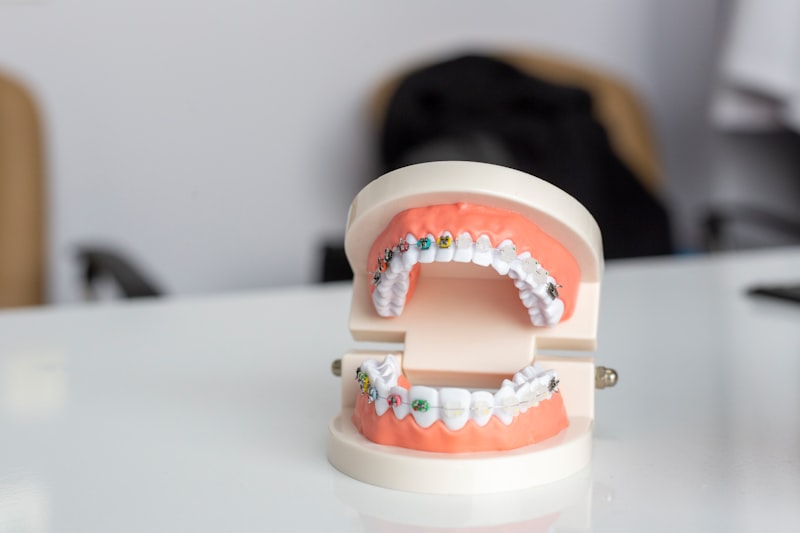So, what can you do to ease the discomfort and enjoy your favorite foods and drinks without cringing? Here are some tips to help you manage sensitive teeth:
-
Use a Desensitizing Toothpaste: Switch to a toothpaste specifically designed for sensitive teeth. These toothpastes contain compounds that help block the sensations traveling from the tooth surface to the nerve, reducing sensitivity over time.
-
Change Your Brushing Technique: Brushing too hard can wear down enamel and expose dentin. Use a soft-bristled toothbrush and gentle, circular motions when brushing. This helps clean teeth effectively without causing further damage.
-
Avoid Acidic Foods and Drinks: Acidic foods and beverages like citrus fruits, soda, and wine can erode tooth enamel and increase sensitivity. Limit your intake of these items or rinse your mouth with water after consuming them.
-
Try a Fluoride Rinse: Fluoride rinses can help strengthen tooth enamel and reduce sensitivity. Use a fluoride rinse daily as part of your oral care routine, especially before bedtime.
-
Protect Your Teeth at Night: Many people clench or grind their teeth while sleeping, which can exacerbate sensitivity. Consider wearing a night guard to protect your teeth from grinding and reduce sensitivity.

Visit Your Dentist Regularly: Regular dental check-ups are crucial for identifying and treating any underlying dental issues that may be causing sensitivity. Your dentist can also apply professional treatments like fluoride varnishes or dental bonding to help reduce sensitivity.
By following these tips and maintaining good oral hygiene practices, you can manage tooth sensitivity effectively and enjoy a more comfortable smile. Remember, everyone’s dental needs are different, so consult with your dentist to determine the best approach for your sensitive teeth.
Soothing Solutions: Expert Tips for Calming Sensitive Teeth Sensations
First things first, what causes sensitive teeth? Well, it usually occurs when the underlying layer of your teeth, called dentin, becomes exposed due to receding gum tissue or enamel wear. Dentin is connected to nerve endings in your teeth, so when it’s exposed, hot, cold, acidic, or even sweet foods and beverages can trigger discomfort.
One of the best ways to tackle sensitive teeth is by choosing the right toothpaste. Look for one specifically designed for sensitive teeth that contains ingredients like potassium nitrate or stannous fluoride. These ingredients help to desensitize nerve endings and build a protective barrier over the exposed dentin.
Ever tried changing your brushing technique? Sometimes, brushing too hard or using a hard-bristled toothbrush can wear down enamel and contribute to sensitivity. Switch to a soft-bristled toothbrush and gently brush in circular motions to clean effectively without causing further damage.
Your diet also plays a crucial role in managing sensitive teeth. Avoiding highly acidic foods and drinks like citrus fruits, tomatoes, and soda can prevent enamel erosion. Instead, opt for calcium-rich foods that strengthen teeth, such as dairy products, leafy greens, and almonds.
If you’re a nighttime teeth grinder, consider using a mouthguard to protect your teeth from grinding forces that can wear down enamel and exacerbate sensitivity.
Lastly, don’t skip your dental appointments! Regular check-ups allow your dentist to identify and treat dental issues early, preventing them from developing into more serious problems that can contribute to tooth sensitivity.
By incorporating these expert tips into your oral care routine, you can effectively calm sensitive tooth sensations and enjoy a pain-free smile. So go ahead, sip that hot tea or indulge in that ice cream—you deserve it!
From Brush to Bite: Effective Dental Care Tips for Sensitive Teeth
First off, let’s talk about choosing the right toothbrush. Opt for a soft-bristled brush instead of hard or medium ones, as they can be harsh on sensitive teeth and gums. Soft bristles gently clean your teeth without aggravating sensitivity, making brushing a more comfortable experience.
When it comes to toothpaste, look for ones specifically formulated for sensitive teeth. These toothpastes contain ingredients like potassium nitrate or strontium chloride, which help desensitize nerve endings in your teeth over time. Remember, consistency is key – use this toothpaste regularly for best results.
Ever heard of the 45-degree rule? It’s a game-changer for sensitive teeth. Hold your toothbrush at a 45-degree angle to your gums when brushing. This technique helps clean along the gum line without causing irritation, ensuring a thorough clean without exacerbating sensitivity.
Now, let’s address mouthwash. Not all mouthwashes are created equal, especially for sensitive teeth. Avoid mouthwashes that contain alcohol, as they can dry out your mouth and potentially worsen sensitivity. Instead, choose an alcohol-free mouthwash with fluoride to strengthen your teeth and protect against cavities.
When it comes to dietary choices, be mindful of acidic foods and drinks. Citrus fruits, sodas, and even certain teas can wear down tooth enamel over time, exposing sensitive areas of your teeth. If you can’t resist that morning orange juice, try using a straw to minimize contact with your teeth.
Lastly, don’t skip your dental check-ups. Regular visits to your dentist are crucial for maintaining good oral health, especially if you have sensitive teeth. Your dentist can provide professional advice, apply fluoride treatments, or recommend desensitizing treatments to alleviate discomfort.
By incorporating these effective dental care tips into your daily routine, you can manage sensitive teeth and enjoy your favorite foods and drinks without wincing. Remember, taking care of your oral health is an investment in your overall well-being – so brush wisely, and smile brightly!
Cold, Hot, Ouch! How to Enjoy Your Favorite Foods with Sensitive Teeth
Firstly, let’s understand why sensitive teeth react to temperature extremes. The outer layer of your teeth, called enamel, protects the underlying dentin and nerve endings. When this enamel wears down or recedes, it exposes microscopic tubules that lead to the nerves. This exposure allows hot or cold substances to stimulate the nerves, causing that familiar twinge of pain.
One effective way to minimize tooth sensitivity is by using a toothpaste designed for sensitive teeth. These toothpastes contain ingredients like potassium nitrate or strontium chloride, which help to block the tubules and reduce sensitivity over time. Make it a habit to brush gently with a soft-bristled toothbrush to avoid further enamel erosion.
Another strategy is to be mindful of what you eat and drink. For instance, when indulging in hot soup or a cold beverage, try using a straw to minimize contact with your teeth. This simple trick can significantly reduce the discomfort caused by temperature sensitivity.
Additionally, consider incorporating foods that promote dental health into your diet. Dairy products like milk and yogurt are rich in calcium and phosphates, which can strengthen enamel and reduce sensitivity. Crunchy fruits and vegetables like apples and carrots can also help clean teeth naturally and stimulate saliva production, which neutralizes acids and protects against tooth decay.
Lastly, if you’re experiencing persistent sensitivity, it’s essential to consult with your dentist. They can identify underlying causes such as cavities, gum disease, or teeth grinding, and recommend appropriate treatments to alleviate discomfort.
By taking these steps and being proactive about your dental health, you can continue to enjoy your favorite foods and drinks without the “ouch” of sensitive teeth holding you back. So go ahead, treat yourself—whether it’s a scoop of ice cream or a piping hot cup of cocoa, you deserve to savor every bite and sip!
Sensitive Teeth SOS: Immediate Relief Strategies You Need to Know
Imagine this: you’re enjoying a relaxing evening with a warm cup of tea when suddenly, a sharp jolt shoots through your teeth. Ouch! Sensitive teeth can turn everyday pleasures into painful moments. But fear not, there are ways to find relief.
First things first, let’s address the cause. Tooth sensitivity often stems from exposed dentin, the sensitive layer beneath the tooth enamel. When this protective layer wears down or the gums recede, it exposes microscopic channels that lead to the tooth’s nerve center, causing that infamous sensitivity.
So, what can you do right now to ease the ache? Start by switching to a soft-bristled toothbrush and gentle brushing technique. Abrasive brushing can wear down enamel and aggravate sensitivity. Opt for a toothpaste specially formulated for sensitive teeth, enriched with potassium nitrate to soothe nerve endings.

Avoid acidic foods and beverages that can erode enamel further, like citrus fruits and sodas. Instead, reach for enamel-strengthening alternatives like milk and cheese, which neutralize acids and promote saliva production. Saliva acts as nature’s defense against tooth sensitivity by maintaining a healthy pH balance in your mouth.
Ever considered a mouthguard? No, not just for athletes! A custom-fitted mouthguard from your dentist can shield your teeth from nighttime grinding, a common cause of enamel wear and tear. Remember, prevention is key to protecting your smile from unnecessary discomfort.
When immediate relief is needed, dab a pea-sized amount of desensitizing toothpaste directly onto the sensitive area and leave it overnight. This allows the active ingredients to penetrate and desensitize nerve endings, providing overnight relief.
Lastly, stay consistent with your oral hygiene routine and don’t skip those dental check-ups. Your dentist can offer professional treatments like fluoride varnishes or bonding agents to alleviate sensitivity and fortify enamel.
By incorporating these strategies into your daily routine, you can regain control over tooth sensitivity and enjoy your favorite foods and drinks without the unwelcome pain. Ready to say goodbye to sensitive teeth? Take charge today and reclaim your smile!
Frequently Asked Questions
What are the best toothpastes for sensitive teeth?
Discover the best toothpastes specially formulated for sensitive teeth. These products are designed to provide gentle yet effective relief from tooth sensitivity, offering protection and comfort with every use. Find out more about the top choices that can help alleviate sensitivity and maintain oral health.
Are there specific foods or drinks I should avoid if I have sensitive teeth?
Discover which foods and drinks to avoid if you have sensitive teeth. Learn how certain items can trigger discomfort and what alternatives can help minimize sensitivity.
How can I adjust my brushing technique to minimize tooth sensitivity?
Learn how to adjust your brushing technique to reduce tooth sensitivity with these concise tips. Discover effective methods to protect your enamel and gums while ensuring thorough cleaning.
When should I see a dentist for sensitive teeth, and what treatments are available?
Learn when to consult a dentist for sensitive teeth and explore available treatments. Discover effective solutions to alleviate sensitivity and improve dental health.
What causes tooth sensitivity and how can I prevent it?
Discover the causes of tooth sensitivity and effective prevention methods. Learn how to protect your teeth from discomfort and maintain oral health.


